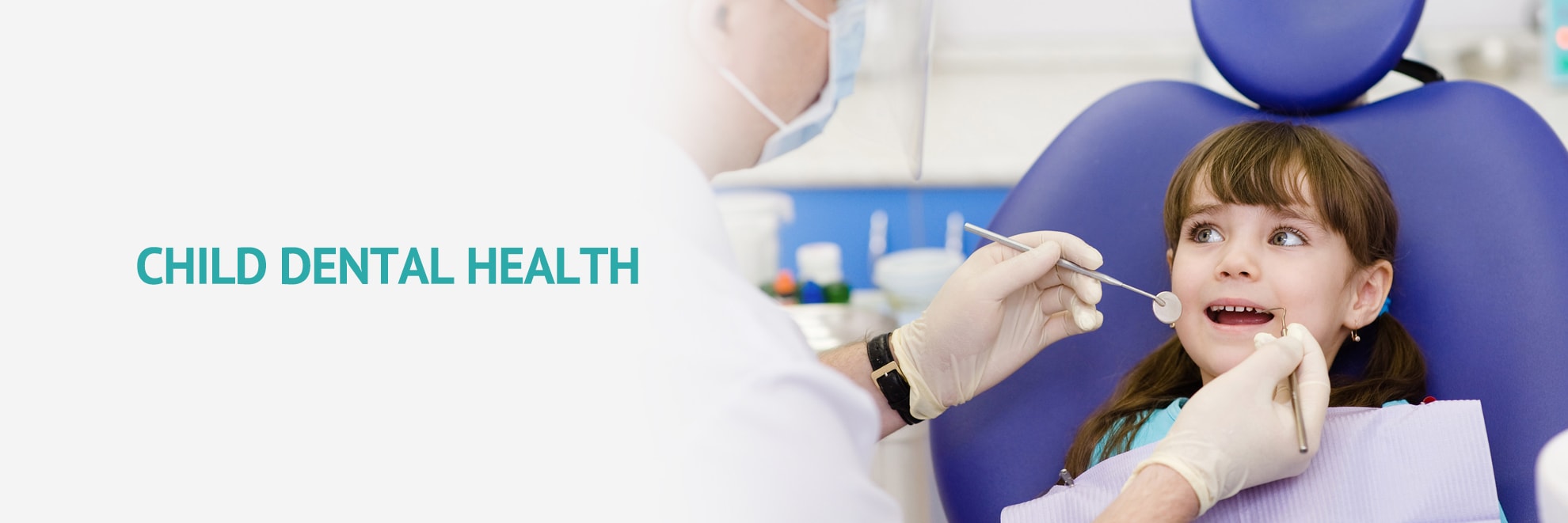Child Dental Health
When does the child get its first teeth?
The first teeth of a child erupt when the child is aged between 3-16 months; normally it occurs at the age of 6 months in most of the children. The first teeth that come out are the two bottom front teeth and this will be followed by four upper teeth.
The exact timing of the first tooth eruption is mainly dependent on genetics; this means that if there is a family history wherein the children get their first teeth late then you child also might get its teeth late.
When does the child get its primary teeth?
The child will get its primary teeth, 20 nos., before he/ she is three years old. It has been found that most of the children get 4 new teeth every 4 months.
When does the child shed its teeth?
Normally the children start shedding their first teeth at the age of six to seven years; when the child reaches the age of 11-13 years the process of shedding the teeth is completed. The last teeth that are shed are the 2nd molars.
When does the child get its permanent teeth?
The eruption of permanent teeth starts at the age of about 6-7 years of age; this continues up to the age of 17-22 years when the child gets its third molar or wisdom teeth
What are the side effects of teething on the child?
In most of the children, teething results in excess saliva flow and the children want to chew hard substances; however, this causes irritation and mild pain in some children that result in swollen and tender gums.
This can be avoided by massaging the gums for a few minutes and allow the child to chew a hard teething ring that is smooth. Teething does not cause diarrhea, fever, diaper rashes or problems of sleeping. Most of the children do not require teething gels or Tylenol treatment for pain; however if necessary you could use them.
When should I begin cleaning my child’s teeth?
You can start cleaning of the teeth of your child immediately after it erupts; use a moist washcloth to wipe and clean the teeth. You could start using a soft toothbrush once the child gets more teeth. You must use either fluoride toothpaste or non-fluoride toothpaste of pea-size quantity until the child learns to spit out the paste. The child’s teeth could get stained if you use too much fluoride.
When should I take my child to the dentist?
Earlier recommendation of the AAP was that the child has to be taken to the dentist at the age of three years. Of late this has been changed to 6 months after the eruption of the first tooth or before the child’s first birthday. This is mainly because it has been found that many children have cavities before they start going to kindergarten.
The following benefits you get by taking the child for examination early and also provide necessary preventive care.
- The smile of the child will be protected not only for the present but also for the future.
- You will get educated about your child’s oral health and also its hygiene.
- Children having stained teeth, crowding/ abnormal tooth development, susceptible for cavity development, thumb sucking habit and bruxism might get benefited.
What are the risk factors for cavity development?
- Children sleeping with bottle/ cup, walking around the whole day drinking juice or when they nurse continuously from the breast are susceptible for cavity development.
- If the child’s mother has lots of cavities the child also could get cavities.
- Children requiring special healthcare and children belonging to low socioeconomic status also are prone to get cavities.
Is it necessary for my child to have fluoride supplements?
The answer to this is yes. In order to prevent the occurrence of cavities it is necessary for all children above six months of age to take supplemental fluoride. Normally most of the children get this fluoride from their drinking water if they take water from the water supplied by the local water supply board. Well water, filtered and bottled water do not normally contain fluorides although there could be exceptions.
It is in good for your child to have sufficient fluorides from drinking water than getting it from additional fluoride drops or supplements. Fluoride in excess quantities might result in the child getting fluorosis which will result in permanent white to brown discoloration of the enamel of the teeth. If the child is given fluoride drops and also getting fluorides from his diet the chances of the child getting fluorosis is higher. Consult your pediatrician or pedodontist before giving your child fluoride supplements
What are the reasons for staining of my child’s teeth?
The staining can occur because of intrinsic staining caused by fluorosis, blood and bile pigments, inherited defects of dentin and enamel, trauma and medications such as tetracycline; extrinsic staining could occur from bacteria and food stains.
Is there any need for applying sealants on the child’s teeth?
The back teeth are normally difficult to clean and are likely to develop cavities; sealants are normally applied to these teeth to protect the grooves and pits of these teeth. The sealants form a barrier against plaque and other substances. You should apply sealants to the 1st and 2nd permanent molars and appropriate premolars after they erupt – when the child is about 6 years old.




